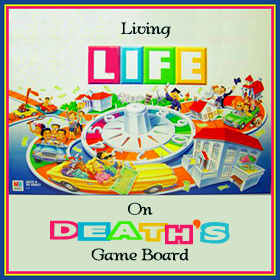
In the aftermath of my sisters serious illness this past week, I couldn't help but share my contemplations on life's strange relationship with death. While we often do our best to avoid the subject, it consistently finds the means to inject itself into our consciousness. As she continues to recover, those of us who know and love her are forced to confront our fears.
For most of us, life is an orderly procession towards death. When we're young, death is barely a blip on our radar...and one that we're able to ignore with ease. During our youth, the world seems limitless and time is bountiful. Each day is an adventure with potential and the promises of the future appear to be endless.
As the years pass, the distant drum of death grows more pronounced. Like a surreptitious riff in each song of life, eventually death demands its due and it becomes increasingly unlikely that we can deny its presence. Sometimes it's the untimely death or the unexpected illness of a loved one or a family friend that awakens us to the fragility of life and the indiscriminate nature of dying. Whatever it may be, our introduction to immortality opens a door that can never again be closed.
For some of us, death walks nearby on a daily basis. In fact, for the gay community, even the most basic of acts has become an untoward dance with death. From the moment a gay teenager imagines his first romance, he must also ponder its potential to shorten his life. We are a community that is denied the opportunity to become brides and grooms, yet we live life forever wed to the possibility that a demonstration of love may set the stage for the final act.
Giving oneself to another has always contained an element of vulnerability. However, when catching the love bug has the potential to be accompanied by an infectious interloper, this innocent act of vulnerability is suddenly transformed into a calculation of calamitous consequences. Though passion is an inevitability; vigilance becomes a necessity. Hence, the pleasure of intimacy can be forever shadowed by the fear of fatality.
HIV isn't exclusive to the gay community, but it is an undeniable adjunct. Every parent of a gay son is torn between their hopes for his happiness and their desire to postpone his pursuit of it. In that difficult dichotomy, one could easily conclude that the risks outweigh the rewards and that the lives of gays are forever filled with trepidation. That would be a reasonable assumption...but it would also be wrong.
In fact, it is in witnessing the loss of those who chose to live life large...in spite of the obstacle of AIDS...that has given the gay community much of its resolve and its resiliency. Truth be told, what unites my memories of those I have lost to HIV was their unflinching desire to live. For each of them, life was not measured in years. Instead, their lives were never allowed to be overshadowed by the fear of death. They knew that all lives end in death...and they rejected the deception that believes one can be enriched by purchasing more years at the expense of less living. The richness of the memories they left behind affirms both the quantity and the quality of the living they did.
In that knowledge, my own view of life has been forever altered. While illness and death still give me pause; I refuse to let them dictate life. Death is not negotiable and attempts to barter with it are far more beguiling than beneficial. Death is undoubtedly an endpoint but it needn't be a constantly constricting continuum. Death may be our final visitor but we mustn't feed it by granting it a place at the table of life. Death will kill us but it needn't prevent us from feasting on life. Death is final; it needn't be preceded by famine.
When life is at risk of being overcome by death, we can cease living in order to watch the monitor...hoping for the slightest of movements to assure us that we still reside in the here and now...or we can turn away from the monitor and place our trust in the heart that has sustained us during our darkest of hours. The former adds a flawed footnote; the latter an exclamation mark.
I accept that death will ultimately prevail...but I refuse to let it dictate that the ending must be a slowly measured fade to black. If life is like theater, I prefer to be an actor on the bright and colorful stage of life...in full regalia...when the final act goes dark with the sudden flip of a switch.
When that moment arrives, I'll stop and silently thank my many mentors for teaching me the merits of living...and for the guidance to make a gracious exit.
Tagged as: Death, Dying, HIV, Illness, LGBT, Life
Daniel DiRito | March 29, 2008 | 11:04 PM |
link
| Comments (2)



There is an ongoing battle over health care in the United States. Those opposed to universal health care argue that the implementation of such a plan will result in a decline in the quality of care. Time and again, they cite the reported delays in accessing needed procedures in those countries that provide such care as evidence. They also make anecdotal assertions about the growing number of foreigners who seek medical care in the United States...while ignoring the same indications that more Americans are seeking medical care in other countries.
While there may be legitimate concerns about the implementation of a universal health care system, I've previously written about the fallacies contained in many of these arguments. I've also directed readers to studies that offer a less than stellar assessment of the health care we're currently receiving.
The recent report from Nevada on the mishandling of syringes and vials, which may have resulted in potentially exposing 40,000 patients to Hepatitis C, is further evidence that our system has its share of deficiencies.
WASHINGTON (AP) -- An outbreak of hepatitis C at a Nevada clinic may represent "the tip of an iceberg" of safety problems at clinics around the country, according to the head of the Centers for Disease Control and Prevention.
The city of Las Vegas shut down the Endoscopy Center of Southern Nevada last Friday after state health officials determined that six patients had contracted hepatitis C because of unsafe practices including clinic staff reusing syringes and vials. Nevada health officials are trying to contact about 40,000 patients who received anesthesia by injection at the clinic between March 2004 and Jan. 11 to urge them to get tested for hepatitis C, hepatitis B and HIV.
Senate Majority Leader Harry Reid, D-Nev., met Monday with CDC head Dr. Julie Gerberding, and on a media conference call after their meeting both strongly condemned practices at the clinic.
Health care accreditors "would consider this a patient safety error that falls into the category of a 'never event,' meaning this should never happen in contemporary health care organizations," said Gerberding.
"Our concern is that this could represent the tip of an iceberg and we need to be much more aggressive about alerting clinicians about how improper this practice is," she said, "but also continuing to invest in our ability to detect these needles in a haystack at the state level so we recognize when there has been a bad practice and patients can be alerted and tested."
Let me attempt to explain exactly what appears to have happened at these clinics. In performing procedures on patients with Hepatitis C, clinicians may have been reusing the syringes used in sedating these infected individuals on other patients...or they were reusing the same syringe a second time on an individual infected with the disease when drawing a sedating medication from a multi-dose vial...which was then used to draw medication to sedate other patients. The bottom line is that the disease could have contaminated either the syringe or the vial containing the sedating medication.
Look, I'm not a doctor or a scientist...but it isn't that difficult to understand that if you put something (a needle connected to a syringe containing a fluid) into a contaminated substance (blood in the tissue of an infected individual in this case), there is a risk that the infected substance can travel into any connected portion of that device (think backwash from a straw or the basic concept of osmotic transfer) or into any container that device may subsequently come into contact with.
So what does this tell us about our health care? Well, according to the representative from the CDC, these clinicians were conducting practices that are NEVER EVER acceptable. In doing so, they were violating a very basic guideline; not some complex concept beyond those capable of rudimentary rational thought. Frankly, if one can't be sedated for a colonoscopy without the risk of contracting Hepatitis C, what hope should we have that a life saving surgical procedure will follow proper protocol?
To be fair, that isn't an argument that affirms the quality of services one might expect under a universal health care system. However, it is a valid criticism of our existing system as well as a rebuttal to those who sing its praises. Truth be told, health care is only as good as the commitment of those who provide it. The argument that universal health care will make the practice of medicine less lucrative may...and I repeat may...have some merit. At the same time, are we to believe that the hippocratic oath is subject to suspension should the bottom line be diminished?
Given the incidence of malpractice and the other previously referenced negative reports on our health care system, it appears that ever increasing profits are no more a predictor of high quality health care than decreased profits would be of lesser quality care. Further, if those in the field of medicine predicate their performance upon profitability, we're all one bad bottom line away from a botched procedure.
Unless and until we restore the word "care" to our health system, it won't actually matter whether it is administered as a result of an open market construct (think 47 million uninsured) or as a function of some degree of universally mandated insurance. The provision of care ought to be a given; not an endless negotiation. It's time we choose to do the right thing. It's a matter of life and death.
Tagged as: Centers for Disease Control, Health Care, Hepatitis C, Hippocratic Oath, Insurance, Malpractice, Mandates, Medicine, Nevada, Poverty, Universal Health Care
Daniel DiRito | March 4, 2008 | 1:50 PM |
link
| Comments (0)



![]()
![]()
